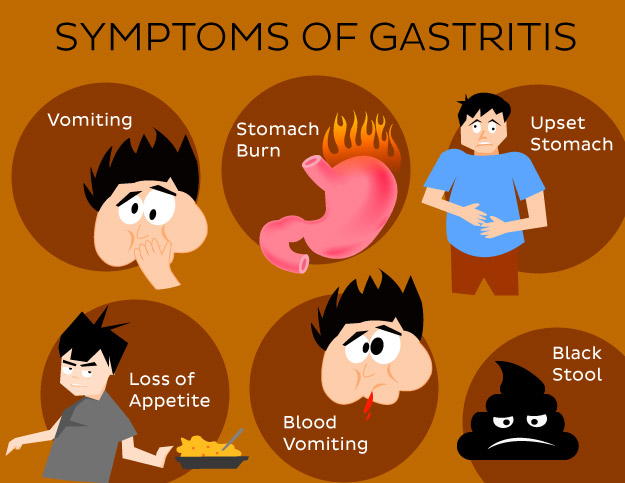Gastritis is a stomach inflammation that may produce bleeding, ulceration, and erosion of the lining. Typical symptoms include upper abdominal pain, nausea, vomiting, bloating, heartburn, and sometimes bleeding. With acute gastritis, the symptoms occur suddenly, caused by an infection, a toxic substance, aspirin and similar drugs, a food allergen, or severe stress from burns, surgery, kidney or liver failure, and other serious conditions. Chronic gastritis often results from alcohol abuse or long-term use of aspirin or another ministerial anti inflammatory drug used to treat arthritis and other painful conditions. Sometimes it is linked to an underlying disorder, such as Crohn’s disease (in which the large and small intestines become inflamed and ulcerated). In hypertrophic gastritis, a rare disorder, the mucosal folds and the stomach lining become enlarged and thickened.

Diagnostic Studies And Procedures
Most occurrences of gastritis are diagnosed on the basis of the symptoms. In severe cases, blood in the vomit may prompt a visit to a doctor. If gastritis is suspected, the doctor will probably order gastroscopy, an inspection of the stomach lining. This is done using a gastroscope, a thin, flexible tube with special viewing devices that is passed into the stomach through the mouth. In some cases, a small tissue sample will be removed through the gastroscope and sent for laboratory studies. Other diagnostic measures may include an upper GI series of X-rays, taken after the patient drinks barium, a chalky substance that coats the stomach and other digestive organs to make them visible on film. A sample of stomach fluids may also be taken for laboratory analysis of the acid level, since reduced secretion of gastric juice is often associated with gastritis. Generally, this sample is drawn out with a tube that is passed through the nose and esophagus to the stomach.
Medical Treatments
Treatment will vary according to the symptoms and the underlying cause. Gastritis from a viral infection is self limiting and does not require any medical intervention. An over the counter antacid may alleviate mild symptoms. If an underlying cause has been found, treating it will usually clear up the stomach problem as well. Severe erosive gastritis calls for prompt treatment to stop any bleeding. When bleeding is profuse, a stomach tube may be inserted and ice water passed through it to constrict any leaking blood vessels. A blood transfusion may be required, though this is rare. If severe bleeding persists, an emergency operation may be performed to remove the eroded part, or, in some cases, the entire stomach.